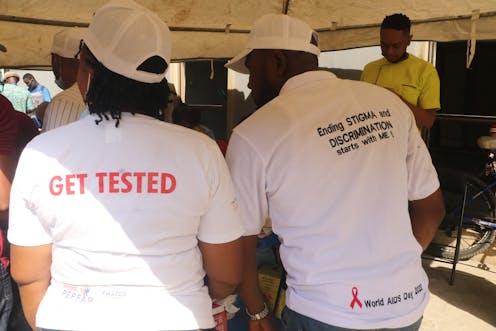
Sub-Saharan Africa is one of the regions most affected by HIV. In Nigeria alone, an estimated 1.8 million people are living with the virus.
Antiretroviral therapy has made strong gains in reducing HIV-related deaths. But people living with HIV in resource-constrained settings, like Nigeria, still face psychological challenges and poor health outcomes that are attributed to HIV-related stigma.
The disclosure of HIV positive status has increased over the years in Africa. This has been linked to increased social support for people living with HIV: relationships and interactions that could have positive effects on a person’s health and well-being. Some researchers in a Chinese study have established that when people living with HIV are supported, their physical and mental quality of life is improved.
The challenge, however, is that some people face rejection and maltreatment from friends, family and important people in their lives following HIV disclosure. This has a negative effect on their mental health and HIV outcomes.
Many researchers have studied overall social support globally. Some have focused on specific support types, such as friendship. Less is known about how much support people living with HIV get from family and significant others like close colleagues or religious leaders.
Our team of scientists in HIV/AIDS research decided to bridge this knowledge gap in the Nigerian context. Our study aimed to assess the prevalence of and factors associated with support from family, friends and significant others. We also assessed whether increased support would reduce stigma among people living with HIV, particularly perceived or internalised stigma.
Social support
In our study, “significant others” was defined as people other than family members that someone feels close to. They could be a respected colleague or a religious leader.
We defined “social support” as moral, financial and emotional support that people received after disclosing their HIV positive status to friends, families, partners or religious leaders. For example, a friend of someone living with HIV could provide support by making sure that they took their HIV medications regularly.
A total of 396 people living with HIV were interviewed across six hospitals in Lagos State between June and July 2021.
The scores for three types of social support (family, friends and significant others) were combined to indicate overall social support.
We also asked respondents about their experience of stigma, their adherence to antiretroviral medication and other relevant medical histories, such as the duration of HIV diagnosis and how long they had been on HIV medication. This allowed us to investigate the association between experience of stigma, social support and HIV treatment adherence.
Read more: COVID deepened inequalities in HIV treatment: what we learnt in Nigeria
Friends reduce stigma
The average age of our respondents was 32 years and 59.8% were female. Most had been diagnosed with HIV within the past five years, and many had been on antiretroviral medication for a long time.
Only half of the respondents had adequate support from family, friends and significant others. We found that when people living with HIV received support from close friends, they were less likely to experience stigma.
Females enjoyed more support from significant others than males. The reason could be that females tended to disclose their HIV status to trustworthy persons sooner than males.
Read more: How theatre can help young Nigerians who are living with HIV
Also, we found that those who earned a higher monthly income had better support from significant others and had better overall support. It could be that some of the respondents got more support because they provided financial support to others. Monthly income was significantly associated with all types of social support among our respondents.
Generally, our study showed that people living with HIV in Nigeria who enjoyed support from family or friends were less likely to be affected by HIV-related stigma and associated poor health outcomes.
Our key message is that people living with HIV need social support from families, friends or significant others to improve their quality of life and reduce HIV-related stigma (especially internalised stigma).
Stigma and health outcomes
We intend to dig deeper into the association between social support, HIV-related stigma and viral suppression among people living with HIV in Nigeria.
We hope to gather empirical data on the impact of HIV-related stigma on mental health outcomes (for example, depression and anxiety) and viral suppression among people living with HIV.
Our long-term goal is to collaborate with a sample of people living with HIV in Nigeria to develop, implement and evaluate culturally acceptable stigma reduction interventions to improve HIV treatment uptake and overall health outcomes.
Dr Oluwatobi Babalola, a medical doctor with the Lagos State Primary Healthcare Board, was part of the research team.
Adeagbo Oluwafemi Atanda receives funding from University of Iowa, National Institutes of Health, United Kingdom Medical Research Council, South Africa National Research Foundation.
Engelbert Bain Luchuo and Oluwaseun Abdulganiyu Badru do not work for, consult, own shares in or receive funding from any company or organisation that would benefit from this article, and have disclosed no relevant affiliations beyond their academic appointment.
This article was originally published on The Conversation. Read the original article.







